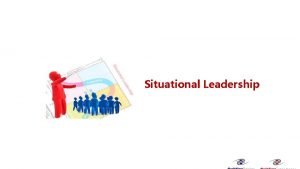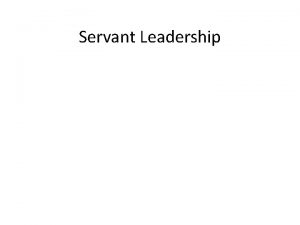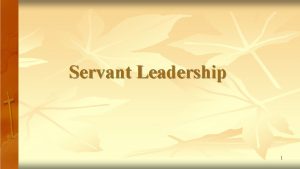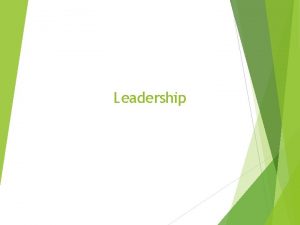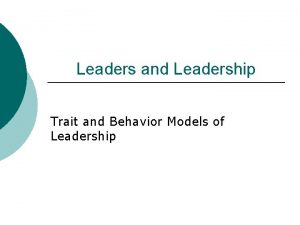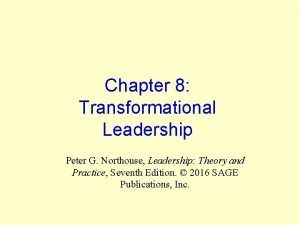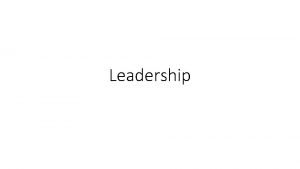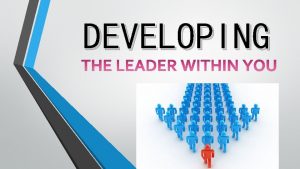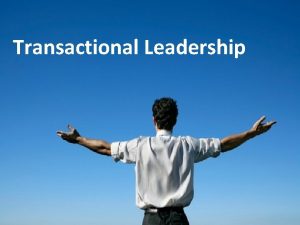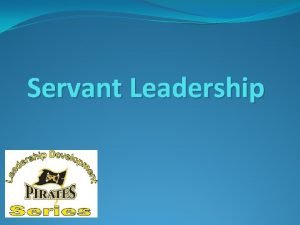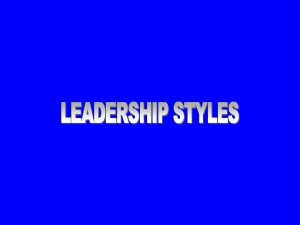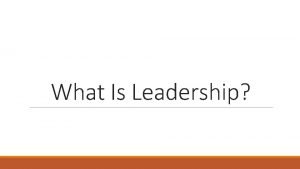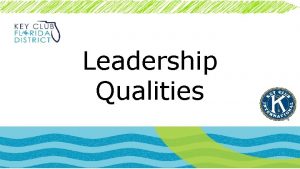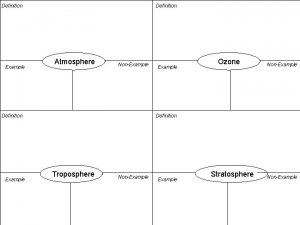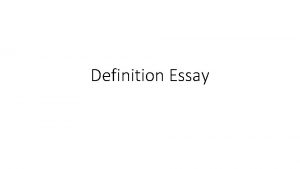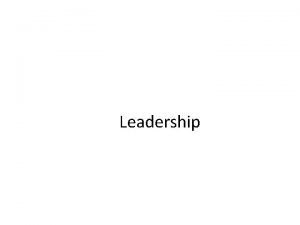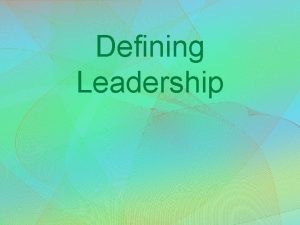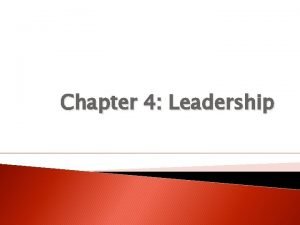What Is Leadership Leadership Definition of leadership from















- Slides: 15

What Is Leadership?

Leadership Definition of leadership from merriam-webster. com 1: the office or position of a leader recently assumed the leadership of the company 2: capacity to lead a politician who lacks leadership 3: the act or an instance of leading

Components of Leadership Gary Yukl, in his book, Leadership in Organizations, specifically Chapter 6, states several times that : “Influence is the essence of leadership”. You can’t be an effective leader without influencing those that you lead. TAfsaneh Nahavandi, in his book, The Art of Science and Leadership states that: “Power is essential to leadership” and “Power and leadership are inseparable” Although power and influence are related there are key differences Leadership positions often come with power attached. Influence is more often related to an individual rather than a position.

What is Power? Definition of leadership from merriam-webster. com Definition of power 1. ability to act or produce an effect 2. legal or official authority, capacity, or right 3. possession of control, authority, or influence over others

How are Power and Leadership Related? v. Power and leadership are inextricably entertwined. v. A great leader cannot be effective without power. v. The best leaders use both personal power (charisma, personality, etc. ) and positional power (authority that comes with their position in the organization), with an emphasis on personal power.

LEADERSHIP BEST LEADERS POWER

The Five Sources of Power ORGANIZATIONAL/POSITION POWERS v. Legitimate Power v. Reward Power v. Coercive Power PERSONAL POWERS v. Expert Power v. Referent Power

Legitimate Power Most positions that are managerial or supervisory in nature, grant the person filling that position a certain amount of authority over other people in the organization. CEO: Generally the highest position within an organization. The authority of the CEO generally trumps that of all other employees in an organization. Manager: Can give orders and instructions to subordinates by virtue of the position that he or she holds, by virtue of their position IT Director: Can establish and enforce policies and procedures for IT matters that apply to all individuals within the organization, by virtue of their position Safety Manager: Can establish and enforce policies and procedures regarding safety that apply to all individuals within the organization, by virtue of their position.

Reward Power TANGIBLE REWARDS Certain positions imbue the employee with the power to provide rewards, such as bonuses, raises, promotions, etc. INTANGIBLE REWARDS These kinds of rewards are tangible rewards. However, anyone in a managerial or supervisory position can provide intangible rewards such as public praise and recognition, or even just a heartfelt “Thank you” for a job well done.

Coercive Power v. Coercive Power is the power to punish or take something away from an employee who does meet certain goals, or who does not follow established procedures. v. Coercive power is often included in the job description of certain managerial and supervisory positions. v. Coercive power is based on fear.

Expert Power Expert power is a type of positional power that is conferred to people in specialized fields such as technology and medicine. For example, an It Director has a very specialized set of skills that allow him or her to assess risks to the organization and to establish procedures for minimizing those risks. An IT Director might insist that all company computer equipment be part of a network that allows the IT department to push updates and install software remotely. This might be necessary so the department can act quickly when widespread malware attacks and software vulnerabilities come to light. An HR Director might insist that the IT Director maintain the ability to remotely “wipe” phones that contain company software and data, including company emails immediately upon termination of an employee. In both cases, employees recognize these people as experts n their field and usually comply out of respect.

Referent Power v. When a manager or supervisor has referent power, this power that comes from his or her personal “likeability” rather than by virtue of their job description or position. v. When employees respect someone as a person this imbues that person with referent power v. A person who has the ability to make others feel good about themselves is also a person who will have referent power.

The relationship between power, influence, and leadership Figure 1 from Fred C. Lunenburg, Fred C. "Power and Leadership: An Influence Process. " INTERNATIONAL JOURNAL OF MANAGEMENT, BUSINESS, AND ADMINISTRATION 15. 1 (2012): Page 5.

Summary of Relationship Between Leadership & Power Effective leaders must have power. The best leaders have a combination of Position Power and Personal Power Position Power has a substantial effect on outcomes, like task completion. Personal Power has a greater effect on job satisfaction, absenteeism, and turnover.

How Relationships Affect Influence & Power v Relationship building is vital to managers who are just starting their careers. v. Relationships can profoundly effect a manager’s ability to lead the team. v. This effect can be positive or negative. v. In ideal situations, members of a department or team respect their manager as a person and inspire the members of their department or team. v. In bad situations, a leader may put personal interests above the best interest of the employees and the company. These types of “leaders” may work well with superiors, but can foster A his can lead to alack of trust within the department, leading to anger, bitterness, and general dissatisfaction on the part of the employees.
 Transactional leadership and transformational leadership
Transactional leadership and transformational leadership Adaptive leadership style
Adaptive leadership style Enthusiastic beginner disillusioned learner
Enthusiastic beginner disillusioned learner Definition of servant leadership
Definition of servant leadership Leader definition oxford
Leader definition oxford Definition de leadership
Definition de leadership Definition of trait theory of leadership
Definition of trait theory of leadership Enterprise leadership definition
Enterprise leadership definition Peter northouse
Peter northouse How does kotter define leadership and management
How does kotter define leadership and management Leadership definition
Leadership definition Definition of leadership training
Definition of leadership training What's the definition of leadership
What's the definition of leadership Transactional leadership definition
Transactional leadership definition Servant leadership definition
Servant leadership definition Pedagogical leadership style
Pedagogical leadership style


